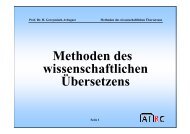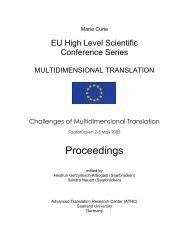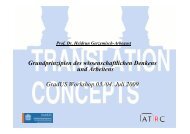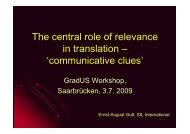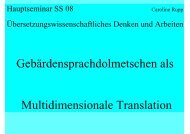Proceedings - Translation Concepts
Proceedings - Translation Concepts
Proceedings - Translation Concepts
You also want an ePaper? Increase the reach of your titles
YUMPU automatically turns print PDFs into web optimized ePapers that Google loves.
MuTra 2006 – Audiovisual <strong>Translation</strong> Scenarios: Conference <strong>Proceedings</strong><br />
Christopher Taylor<br />
transfer involves some kind of semantic or pragmatic shift (e.g., bar protocols in English and<br />
Italian). Clearly the scope for original language use is constantly present but some basic<br />
blueprints can be recognized, especially in the more mainstream productions.<br />
3.1 Less predictable genres<br />
In contrast to the examples posited above, some genres, particularly where cultural mores are<br />
involved, prove much less easy to pin down. A case in point when discussing English-Italian<br />
film-making and translation is that concerning food. A comparison of attitudes to, and<br />
consequently frequency of mention of, and language connected to food was summed up in<br />
Mikes’s 1949 assertion that “On the Continent people have good food. In England they have<br />
good table manners” (Mikes 1949).<br />
While English habits regarding food have changed considerably in the past fifty years,<br />
Fox still finds in her popular anthropology volume of 2004, that “the English disdain for<br />
matters concerning food is a reflection of the innate reluctance on the part of English people<br />
to take themselves (or anything else) seriously” (Fox 2004: 295).<br />
On the new, but relatively restricted, phenomenon of ‘foodieness’, she reflects ironically<br />
that “One minute it’s sun-dried tomatoes with everything, the next minute these are passé, and<br />
it’s raspberry vinegar, or garlic mash, or ‘delicate layers of potato rosti wth goat-cheese filo<br />
parcels and horseradish sabayon’.” (Fox 2004: 300).<br />
Even more so than the previously impoverished culinary vocabulary of the English, such<br />
concepts are difficult to translate into cultures that don’t regard these ingredients as in any<br />
way exotic. To take a typical scenario as an example, at Italian dinner parties the following<br />
comments, or variations thereupon, are very common.<br />
Buonissimo!<br />
Ma come riesci a fare questi fagiolini?<br />
Da noi si usa solo aglio e olio.<br />
Sono la fine del mondo!!<br />
These expressions (not the words) are difficult to translate for the simple reason that<br />
English people don’t say them. The following exchange from ‘Intolerable Cruelty’ is another,<br />
albeit humorous, case in point:<br />
Miles:<br />
Waitress:<br />
Miles:<br />
Just bring him an iceberg lettuce and mealy tomato wedge smothered in<br />
French dressing<br />
And for you?<br />
Ham sandwich on stale rye bread, lots of mayo, easy on the ham.<br />
• Miles: A lui portiamo una lattuga con pochissimi pomodori, sale e olio di<br />
semi.<br />
• Waitress: E per Lei?<br />
• Miles: Un velo di prosciutto su pane ben raffermo soffocato dalla maionese.<br />
In these cases, the Italian translation is often semantically inaccurate and at times an<br />
invention, for the same reason that foods are not described this way in Italian.<br />
A tension therefore exists, when translating from English to Italian, between the<br />
temptation to translate literally and maintain the foreign flavor, and to tone everything down<br />
in a localization exercise. Thus, the pitfalls for the translator lie between the extremes of total<br />
disdain and novelty obsession, as neither position is taken up in Italian contexts. This is not a<br />
question of culture-bound terms – polenta, mushy peas – but of cultural mind sets.<br />
118





